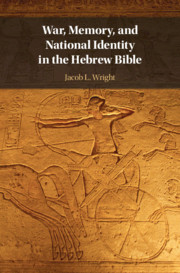
-
- You have access
- Open access
- Cited by 5
-
Cited byCrossref Citations
This Book has been cited by the following publications. This list is generated based on data provided by Crossref.
Winkler, Mathias 2021. The ancestors’ masculinities in Genesis. Journal for the Study of the Old Testament, Vol. 46, Issue. 2, p. 269.
Markl, Dominik 2022. Triumph and Trauma: Justifications of Mass Violence in Deuteronomistic Historiography. Open Theology, Vol. 8, Issue. 1, p. 412.
Gonzaga, Waldecir and Machado Vianna Torres, Marcela 2022. Rahab, la ramera: mujer de fe (Heb 11,31) y de buenas obras (Sant 2,24-25). Revista Yachay, Vol. 39, Issue. 76, p. 161.
Esterhuizen, Elizabeth (Liza) and Groenewald, Alphonso 2024. Unveiling the depths of trauma and the profound impact of rape and shaming on the Babylonian women in Isaiah 13:16 – A trauma and resilience reading of the violent narrative in Isaiah 13:16. Pharos Journal of Theology,
Toczyski, Andrzej 2024. Identity and Otherness in the Rahab Story. Analysis of the Rahab Speech (Josh 2:9–11). The Biblical Annals, Vol. 14, Issue. 4, p. 557.
- Publisher:
- Cambridge University Press
- Online publication date:
- July 2020
- Print publication year:
- 2020
- Online ISBN:
- 9781108691512
- Creative Commons:
-
This content is Open Access and distributed under the terms of the Creative Commons Attribution licence CC-BY-NC-ND 4.0 https://creativecommons.org/creativelicenses


